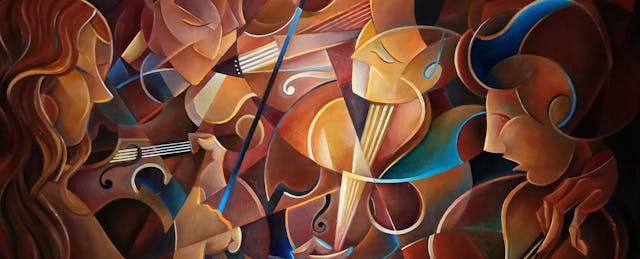If you were fortunate enough to have music education in school, what were those classes like? Did you pick up an instrument—say, a recorder or violin, and learn how to play the scale and simple melodies? Did you listen to the classics and learn about the history of music?
Musicians and music educators alike say that learning music is so much more than just playing an instrument, or learning about your favorite artists. It’s a window into other disciplines—and life skills—and teaches you how to learn and get along.
That’s what Lorrie Murray, executive director of the Bay Area Music Project, told EdSurge earlier this fall. And it’s a sentiment echoed by a rock legend, Steven van Zandt, who most people have heard (as a member of Bruce Springsteen’s E Street Band) or watched (as the mobster Silvio Dante in “The Sopranos”).
Murray and van Zandt are our guests on this week’s EdSurge podcast, and they share their different approaches to music education. Both say that although music may not be a lifestyle and profession for everyone, it can teach everybody lifelong lessons.
Listen to this week’s podcast on Apple Podcasts, Overcast, Spotify, Stitcher, Google Play Music or wherever you listen, or in the player below.
“As much as we love to be known as a music program, we’re a social development program,” says Lorrie Murray, executive director of the Bay Area Music Project. The nonprofit, based in the San Francisco Bay Area, provides music education to children in communities that lack these opportunities.
The Bay Area Music Project started in 2014, as an after-school pilot project at Maya Lin, an art-integrated, magnet school in Alameda, California. There was hardly any funding that first year, so the 40 students who participated learned to use a free instrument—their voice. The second year, it launched a violin program with instruments that were rescued from a dumpster at a nearby middle school.
Throughout those trying years, Murray looked for support from local community partners, including the local Rotary Club and firefigher’s association. And they came through. Today, the after-school program is offered at two schools, serving about 160 children.
More importantly, it has the instruments to stock a full orchestra, with strings, winds, brass and percussion sections. Students have performed with professionals, from the nearby UC Berkeley Symphony Orchestra to members from The Simón Bolívar Symphony Orchestra, from Venezuela. Last year, some performed at Salesforce’s annual conference with perhaps one of the most famed cellist of our time: Yo-Yo Ma.

But just as the purpose of music education isn’t just about learning how to play music, the goal of the Bay Area Music Project isn’t to turn kids into professional performers. For Murray, a more important goal is to “raise our future leaders, to raise kids to be confident in themselves and understand that there is a world beyond them.”
The Bay Area Music Project is inspired by a unique philosophy of music education, called “El Sistema,” which traces its roots to the 1970’s in Venezuela. The idea is that music education is more than just music itself; it’s a means of uplifting and unifying underserved communities. It’s the belief that learning how to play music together is a powerful force for bringing together children across different backgrounds.
“There’s no other place like an orchestra where people from varying backgrounds and coming from different ideas have to come in and be one together,” she says. “We have a piece of music that we all need to perform. Percussion, winds, strings all have their parts, and they all have to be in agreement.”
She continues: “And that is the bigger issue in life, right? We are not always going to have the same background or viewpoint or come at it with the same idea. But at the end of the day, what do we want most? It’s to resolve conflict, and to be in agreement with respect to one another. So the orchestra is the vehicle through which kids have to learn to listen.”
Across the country, a rock legend is taking another approach to music education as a way to help students in the classroom. That rocker is Steven Van Zandt, who plays for Bruce Springsteen’s E Street Band, and also appears in “The Sopranos” — among many claims to fame.

In 2007, Van Zandt—or “Little Steven” as he’s more commonly known—established The Rock and Roll Forever Foundation, based in New York. Contrary to what the name might suggest, it’s not about learning how to rock, or play music in general.
Last year, the group released TeachRock, an online music history curriculum with more than 170 lessons, covering the blues, British invasion and other genres that influenced rock. It also explores contemporary artists, like Ariana Grande and Beyoncé, looking back at the artists who influenced them.
Van Zandt says TeachRock is more than just music history; the idea is to use music as a hook to explore all kinds of subjects, from English to science and social studies. He hopes that “the more that arts are integrated into an education program, the better those kids are at the other disciplines. In other words, the arts can stimulate how they learn and engage in other disciplines.”
Like Murray, of The Bay Area Music Project, Van Zandt believes there’s a lot to lose when arts and music programs get cut.
“We lose the ability of the arts to stimulate creativity, which carries into sciences and technology,” says Van Zandt. “The arts tends to connect the dots … from our senses, to our imagination, to our craft.”
And it’s not just creativity that’s lost. One of America’s biggest exports—or certainly one of its most influential one—is entertainment, popular culture and music.
“There’s a practical usefulness for art in the business world as well,” he adds. “And by the way, you don’t have to be an artist to make a living in the arts. Just in rock and roll alone, we have hundreds of people employed, from computer programmers to lighting people, to ... carpenters, metal workers, electricians, bus drivers, truck drivers, graphic artists, everything else. So there are hundreds and thousands of jobs per project involved in the arts. Whether or not you’re the artist is irrelevant.”


